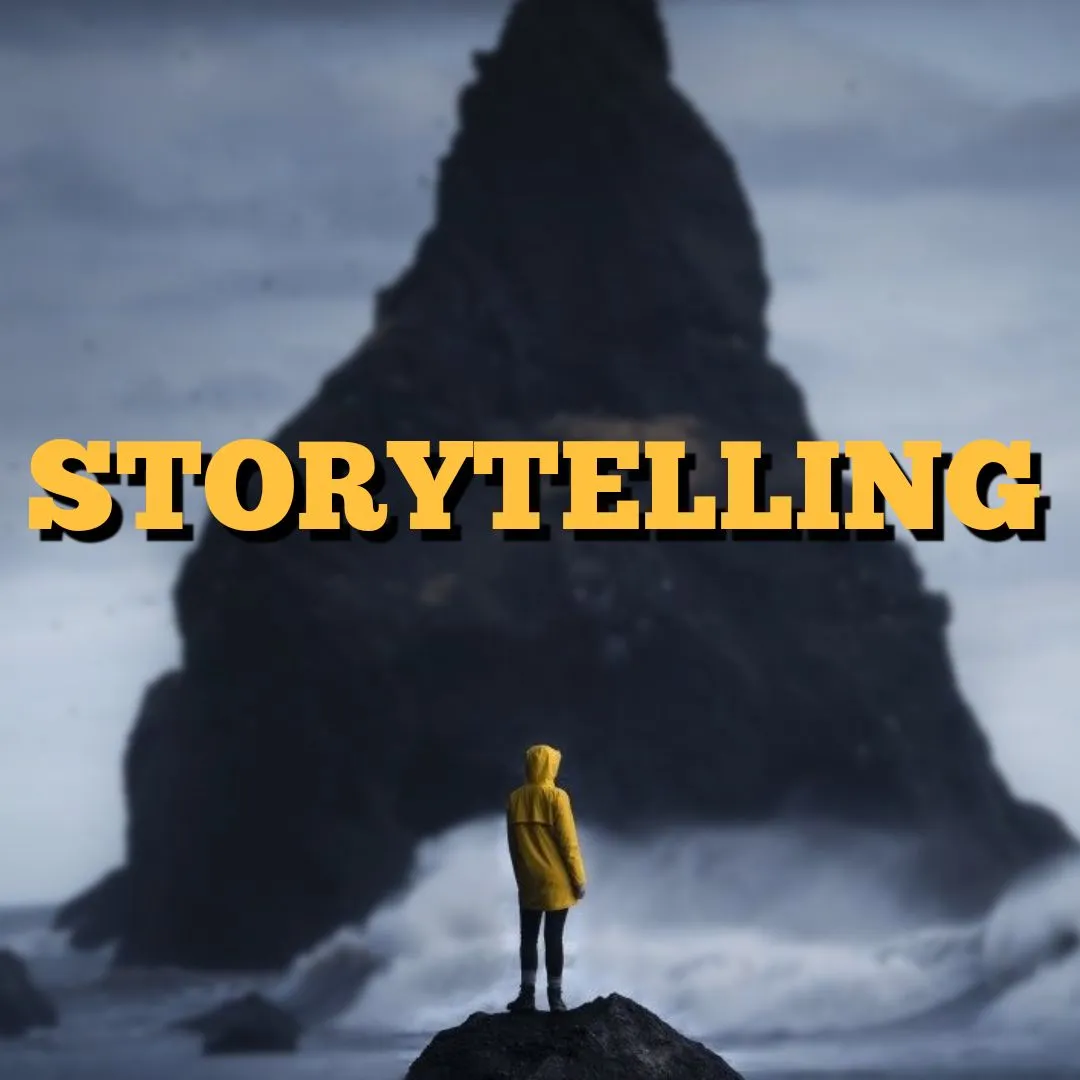
Portada a partir de fuente
A los seres humanos nos encantan las historias.
En cualquier formato, forma o estilo. No podemos resistir la tentación. Cada vez que algo despierta nuestra curiosidad no hay vuelta atrás. Siempre vamos a querer saber más.
Esto no es una característica exclusiva del hombre moderno. Sucede desde la época de las cavernas donde nos sentábamos alrededor del fuego a escuchar al líder de la manada. La historia le daba sentido a nuestra existencia y aquel encargado de contarla nos parecía un intermediario entre la realidad y lo divino.
Porque siempre quien ha contado la historia ha tenido el poder.
Pero contar buenas historias es, además de un arte, un oficio. Responde a una lógica y se puede aprender. Una vez comprendido su ADN nos daremos cuenta de que existen principios y fórmulas que pueden ser reproducidas.
Y lo mejor. Podemos empezar a aplicarlas hoy mismo a nuestras publicaciones y empezar a acumular lectores curiosos por saber más, y que ya no tengan vuelta atrás.
8 pasos para el storytelling de tus publicaciones
Como en cualquier película de aventura, el héroe debe hacer un viaje.
Nuestro lector, una vez comenzado el artículo, recorre el mismo camino.
1- El Mundo Ordinario
2- El Disparador
3- La Búsqueda
4- La Sorpresa
5- Elección Crítica
6- Climax
7- Resolución
8- Conclusión

Todas las personas intentamos, de diferentes maneras, salir de nuestro mundo ordinario. Siempre estamos buscando respuestas, incluso sin estar conscientes de ello.
Por eso una de las maneras de atrapar la atención de tu lector es mostrarles que tienen un problema. Hacerle entender su gravedad, o resaltar su impacto.
A veces no lo tienen claro. Entonces tu trabajo es hacérselo más fácil.
Puedes ayudarlo enumerando las dificultades que le provoca el problema:
- dificultad 1
- dificultad 2
- dificultad 3
También puedes mostrar la manera en que esto le afecta a un segmento de la población, o a ti mismo. De este modo es más probable que se identifique.
Por supuesto que existe una solución. Una de las primeras interrogantes que viene a la mente de nuestro lector es: ¿Y que hay para mí aquÍ?
Tiene que ver que existe un remedio, una cura. Y tiene que verla rápido, si quieres que se quede el resto del artículo.
Presenta la solución y algo más importante:
Prueba el porqué funciona.
¿Cuántas personas se han beneficiado? Muestra pruebas que aseguren que lo que dices es correcto.
- Cifras.
- Estudios.
- Estadísticas.
- Testimonios.
Una persona se siente más cómoda si se da cuenta que forma parte de un grupo mayor.
Tu lector confiará en ti si le convences de que no está solo y te dejará que le guíes al siguiente paso.
No se trata de la búsqueda para encontrar la solución, esa ya la presentaste al principio.
Es la búsqueda hacia dentro, hacia las causas del problema. ¿De dónde surge? ¿Cuáles son sus fundamentos? ¿Cuáles son los conceptos que debe manejar? ¿Existe relación entre ellos?
Ayuda mucho que compartas los links de tus referencias (y ayuda también al SEO). Libros, artículos, podcasts. Esencialmente de donde sacaste la información, para que las personas puedan acceder a ellas también.
Esta puede ser la parte más densa del artículo así que ayuda mucho el uso de tablas, infografías, y cualquier otro recurso visual.
Quieres conseguir en tu lector una comprensión profunda, para que así no olvide la manera de resolver su problema (ni olvide tu publicación)
¨No lo había visto de esta manera. Mmm... Interesante.¨
Estas son las reacciones que buscas conseguir mientras ofreces una perspectiva fresca y diferente relacionada con el problema.
Una vez más, a veces la mejor forma de apropiarse de un nuevo conocimiento es mediante la información visual. Por lo que el uso de multimedias y gráficos en este paso multiplica el impacto.
Estas imágenes luego puedes reutilizarlas en otras redes sociales (Instagram, Pinterest, Liketu), así que vale la pena invertir tiempo en ellas.
Si logras que tu lector no pueda resistir la opción de ¨robársela,¨ habrás ganado.
¿No es cierto que cuando superamos un gran obstáculo empezamos a ver el mundo diferente?
El obstáculo superado es directamente proporcional al cambio de perspectiva que produce en nosotros.
Toda gran solución implica un cambio de conducta, esto es una ventaja pero también implica un riesgo. Porque las cosas dejarán de ser como antes.
¿Recuerdas el Paso 1?
Conviene recordarle a tu lector su punto de inicio para que vea todo lo que ha cambiado en apenas unos cientos de caracteres. El próximo paso requiere que tome acción.
Es el momento de aplicar la solución. Pero recuerda:
Una solución difícil de ejecutar se convierte en un nuevo problema.
Entonces tu trabajo consiste en simplificar lo máximo posible. Ofrece un conjunto de acciones concretas, sencillas y recordables. Las mejores lucen de esta manera:
- tablas
- checklists
- resúmenes
- bullets points
7- Resolución: Salva el día, encuentra el tesoro. Y algo más...
El final de cada aventura es cuando nuestro héroe vence al malo, salva a la chica y consigue el botín.
O dicho de otra manera: enfrenta su problema, aplica una solución y, como recompensa, abandona su mundo ordinario y obtiene un nuevo YO.
Estas pautas te indican el camino a seguir en este paso:
¿Cumpliste la promesa que planteaste en el título?
¿Qué puede ganar tu lector al resolver su problema?
¿Cómo cambiará su vida?
Empaqueta tu publicación y ponle unos lacitos de colores. Tu objetivo es que la persona no solo dé like, sino que pulse ¨Guardar¨

Aquí tu lector decide si le fue provechoso dedicarte esos momentos de su vida. Si resulta que sí entonces querrá saber más sobre ti. Dile quien eres y en donde puede encontrarte.
Por último. ¿Estás vendiendo algo? Suéltalo aquí.
Algunas plataformas, como Substack, te permite insertar un botón de seguir, justo encima del panel de likes y comentarios. En otras, como en Twitter, puedes recolocar el primer twitt para facilitar la interacción de los usuarios.
Personalmente me gustaría que existiera en Hive la opción de insertar un botón de seguimiento justo al final del post, así me evitaría el esfuerzo de hacer scroll hasta el principio solo para seguir al autor.
Este artículo explica una versión simplificada de la plantilla que utilizo actualmente para redactar mis artículos. Está basada en los 8 Puntos de la Historia, una estructura narrativa muy utilizada en las artes narrativas.
Mas información aquí aquí y aquí
ENGLISH
Human beings love stories.
In any format, form, or style. We can't resist the temptation. Whenever something arouses our curiosity there's no turning back. We will always want to know more.
This is not an exclusive characteristic of modern man. It has been going on since the time of the caves where we sat around the fire listening to the leader of the pack. History gave meaning to our existence and the one in charge of telling it seemed to us an intermediary between reality and the divine.
Because the one who has told the story has always had the power.
But telling good stories is not only an art but also a craft. It responds to logic and can be learned. Once we understand its DNA, we will realize that some principles and formulas can be reproduced.
And the best part. We can start applying them today to our publications and start accumulating readers who are curious to know more and have no turning back.
8 steps to storytelling your publications:
As in any adventure movie, the hero must go on a journey.
Our reader, once the article has begun, travels the same path.
- 1- The Ordinary World
- 2- The Trigger
- 3- The Search
- 4- The Surprise
- 5- Critical Choice
- 6- Climax
- 7- Resolution
- 8- Conclusion
We all try, in different ways, to get out of our ordinary world. We are always looking for answers, even without being aware of them. That's why one of the ways to catch your reader's attention is to show them that they have a problem.
Make them understand its seriousness, or highlight its impact. Sometimes it's not clear to them. So your job is to make it easier for them.
You can help them by listing the difficulties the problem causes them:
- difficulty 1
- difficulty 2
- difficulty 3
You can also show how this affects a segment of the population, or yourself. In this way, he is more likely to identify himself.
Of course, there is a solution. One of the first questions that come to our reader's mind is: What's in it for me?
He has to see that there is a remedy, a cure. And he has to see it fast if you want him to stay for the rest of the article.
Present the solution and more importantly:
Prove why it works. How many people have benefited? Show proof that what you say is correct.
- Figures.
- Studies.
- Statistics.
- Testimonials.
A person feels more comfortable if they realize they are part of a larger group.
Your reader will trust you if you convince him that he is not alone and let you guide him to the next step.

source
It is not the search to find the solution, you have already presented that at the beginning.
It is the search inward, towards the causes of the problem. Where does it come from? What are its foundations? What are the concepts you need to handle? Is there a relationship between them?
It helps a lot if you share links to your references (and it also helps SEO). Books, articles, podcasts. Essentially where you got the information from, so people can access them as well.
This can be the densest part of the article so it helps a lot to use tables, infographics, and any other visual resources.
You want to give your reader a deep understanding, so they don't forget how to solve their problem (or forget your publication).

source
I hadn't seen it this way. Mmm... Interesting.
These are the reactions you are looking to get while offering a fresh and different perspective related to the problem.
Again, sometimes the best way to appropriate new knowledge is through visual information. So the use of multimedia and graphics in this step multiplies the impact.
These images can then be reused in other social networks (Instagram, Pinterest, Liketu), so it's worth investing time in them. If you manage to make your reader can't resist the option of ¨stealing it,¨ you will have won.
Isn't it true that when we overcome a major obstacle we begin to see the world differently?
The obstacle overcome is directly proportional to the change of perspective it produces in us.
Every great solution implies a change of behavior, this is an advantage but it also implies a risk. Because things will stop being the way they were before.
Remember Step 1?
It's worth reminding your reader of their starting point so they can see how much has changed in just a few hundred characters. The next step requires you to take action.
Package your publication and put some colorful ribbons on it. Your goal is that the person not only likes it, but also clicks Save¨.
It's time to apply the solution.
But remember: A solution that is difficult to execute becomes a new problem.
So your job is to simplify as much as possible. Offer a set of concrete, simple, rememberable actions. The best ones look like this:
- tables
- checklists
- summaries
- bullets points
7- Resolution: Save the day, find the treasure. And something more...
The end of each adventure is when our hero defeats the bad guy, saves the girl, and gets the loot.
Or put another way: he faces his problem, applies a solution and, as a reward, leaves his ordinary world and gets a new ME.
These guidelines point you in the right direction for this step:
Did you fulfill the promise you stated in the title?
What does your reader stand to gain from solving his problem?
How will it change his or her life?
8- Conclusion: And you, who are you?
Here your reader decides if it was useful for him/her to dedicate those moments of his/her life to you.
If yes, then he/she will want to know more about you. Tell him who you are and where he can find you.
Finally, are you selling something? Release it here.
Some platforms, like Substack, allow you to insert a follow button, right above the likes and comments panel. On others, like Twitter, you can reposition the first tweet to facilitate user interaction.
I would like to have the option in Hive to insert a follow button right at the end of the post, so I would avoid the effort of scrolling to the beginning just to follow the author.
This article explains a simplified version of the template I currently use to write my articles. It is based on the 8 Points of the Story, a narrative structure widely used in the narrative arts.
More information here here and here
Mi nombre es Dito Ferrer, soy un escritor, psicólogo, realizador de sonido y Dj. Estoy construyendo un espacio educativo para emprendedores, escritores, artistas y todo aquel que necesite crear contenido para Internet.
My name is Dito Ferrer, I am a writer, psychologist, sound designer, and Dj. I'm building an educational space for entrepreneurs, writers, artists, and anyone who needs to create content for the Internet.
- Creación de contenido / Content creation
- Emprendimiento / Entrepreneurship
- Storytelling / Storytelling
- Narrativa / Narrative
- Sonido / Sound
- Web3 / Web3
- y me encanta escribir sobre Juego de Tronos / and I love writing about Game of Thrones.
Sígueme en mis redes Sociales / Follow me on social media
Twitter
Instagram
LinkedIn
Hive
Facebook
Mastodon
Quora
Youtube




